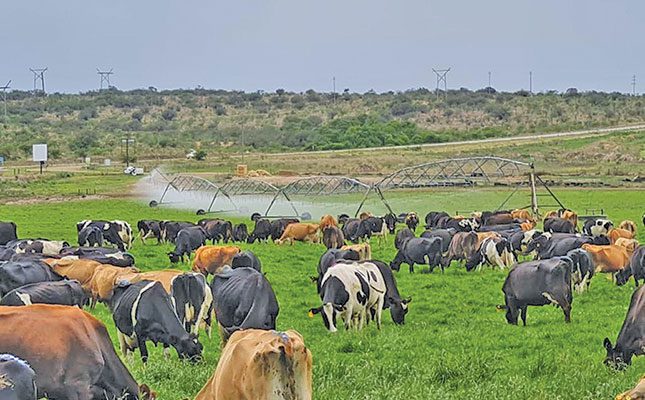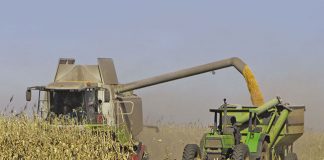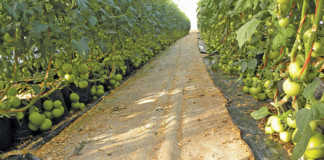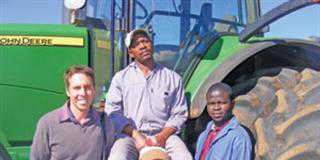
Photo: Amadlelo Agri
Milk production is a complex business, but add farming on communal tribal land into the mix, and you’re destined to walk a rocky road. Nonetheless, this is the path that several communities, business people and commercial farmers in the Eastern Cape and KwaZulu- Natal chose to follow in 2004 when they formed Amadlelo Agri, a company that runs dairy farms and helps emerging black producers grow their operations into profitable agribusinesses.
In 2019, businessman Simpiwe Somdyala took over the reins as CEO of Amadlelo and restructured the company into a 72% majority black-owned agribusiness. Today, its ownership is comprised as follows:
Tulsacap (46,4% share), a group of black professionals and business people, which includes Somdyala, who pooled funds into the company in 2017;
- Amadlelo Milk Producers’ Investment Company (AMPIC), with a 26,8% share. This consists of about 50 white commercial farmers from KwaZulu-Natal and the Eastern Cape;
- Vuwa Investments (18,8% stake), a 100% black-owned holding company; and
Amadlelo Empowerment Trust (8%), which represents 500 black farmworkers of AMPIC members.
According to Somdyala, the dream behind the establishment of Amadlelo “has always been to unlock dormant [tribal] land and create viable rural or agricultural areas with the help of commercial farming knowledge”.
For the first three years or so, it might have seemed that little was taking place at Amadlelo. But this was certainly not the case; during this time, a group of commercial farmers and black business people were meeting and trying to decide which dairy farming model would best serve their dream.
Working through Vuwa Investments, they approached the University of Fort Hare in the Eastern Cape, and looked at various funding models.
By collaborating with these expert partners beforehand, Amadlelo was able to hit the ground running. Based on their research, they decided that New Zealand’s ‘share-milking model’ would be the best fit for their communal dairy farming operations.
According to careers.govt.nz, a share-milker either milks a dairy farmer’s cows for a share of the profits, or has his or her own herd of cows, milking them on a farmer’s land for a share of the profits. In Amadlelo’s case, it does the latter.
Milk production kicks off
In 2006, with partial funding from the Land Bank and in collaboration with the University of Fort Hare, Amadlelo established its first dairy, the Fort Hare Dairy Trust, in the town of Alice, Eastern Cape.
Somdyala explains that the university was an outstanding resource; it enabled them to learn how to run dairy farms in the province, and it was a ready source of top agricultural students who wanted to gain hands-on experience by participating in the company’s internship programme.
Two years later, in conjunction with the National Empowerment Fund (NEF), Amadlelo set up the Middledrift Dairy on previously unused land that belonged to 65 beneficiaries of the Middledrift community.
In order to establish this second dairy, Amadlelo provided its expertise and R8,2 million in start-up capital, and the NEF granted the company a R9,5 million loan.
“Today, [the Middledrift Dairy’s] 700 cows are able to produce 7 800ℓ of milk on 165ha of pasture,” says Somdyala.
Since the founding of the Middledrift Dairy, Amadlelo has been involved in the development of three more community dairies in the region: Ncora Dairy Farm in the town of Ncora, Seven Stars Trust in Keiskammahoek, and Shiloh in Whittlesea. These were established with financial support from government, which funded the infrastructure.
Amadlelo’s milk is transported to Sundale Dairy in East London and Danone South Africa’s dairies around the country, where it is processed into full-cream milk, amasi, cheese and yoghurt.
Financing woes
Over the years, Amadlelo has also been able to acquire financial support from Mutual & Federal Risk Financing. In general, however, acquiring funding has been anything but easy.
“The biggest challenge is the fact that we’re asking financiers to loan [Amadlelo] money for a piece of underutilised land with nothing on it,” laments Somdyala.
He admits that it’s very risky to fund a business that has few or no tangible assets.
“No South African funding model, whether private or governmental, truly addresses the challenges involved with farming communally on tribal land, and this really needs to be addressed.”
Barriers to progress
Another challenge that Amadlelo has no control over is service delivery. “This is a critical issue in rural areas,” says Somdyala. “It can easily take up to two weeks for a veterinarian to visit your farm, and by then the sick [or injured] animal could be dead or have suffered so severely that it will never recover.”
Biosecurity, too, is a major hurdle for Amadlelo. An ongoing problem, for example, is that people living nearby will simply cut fences to move their animals onto better veld.
“This is a massive problem, and merely focusing on our dairies’ biosecurity doesn’t help. The issue needs to be addressed on a regional level and in partnership with government,” he stresses.
On the topic of help from government, Somdyala says that extension officers would also be very welcome. “We don’t only need [more] extension officers, though; we need them to be more knowledgeable so that they can assist communities to improve their farming practices.”
Another major concern is poor infrastructure, particularly for water. “The irrigation infrastructure [near our dairies], for instance, is very old and really needs attention.”
A common problem, he explains, is that a pipe will burst, and a dairy project will then be without water for a lengthy period.
“Even if one pipe is fixed within two weeks of bursting, another may burst soon after that, and we can easily be stuck without running water for months at a time.”
Somdyala says that even a single day without water at a dairy has a devastating impact on the herd’s productivity.
“A dairy requires a lot of water, not only for the cows to drink, but also to keep the equipment clean. This truly is a critical service, and a lack of a reliable water supply hampers our productivity.”
He emphasises that it’s crucial for government to deal with this problem, but not in a superficial way: “The problem of old infrastructure needs to be addressed at its core.”
While Amadlelo has had several positive engagements with the Department of Water and Sanitation over the years, Somdyala says much still needs to be done.
“Approximately one-third of the water [we use in Keiskammahoek, Ncora and Whittlesea ] is wasted due to old pumps and irrigation systems. We live in hope that this problem will be addressed in a sustainable way. This is about the betterment of the lives of the people of South Africa.”
Environmental issues
Water issues have been central to Amadlelo’s business since the drought began in 2015.
“While the business survived the drought, it was scarred,” says Somdyala bluntly. If its business model had been any different, Amadlelo would have been forced to close three of its dairies. As it was, the company persevered, moving animals around to survive the adverse environmental conditions. This came at a cost, however.
“Dairy cattle are very sensitive. If you move them around, their milk production declines,” explains Somdyala.
During the drought, milk production at Amadlelo dropped by seven million litres a year, but the group is working to recover its entire volume.
Severe as it was, the drought was not the only factor that contributed to the fall in production, according to Somdyala. “Climate change in general has had a big impact on us. Our pasture has also suffered the effects of locust swarms.”
Investing in the future
Despite all of these barriers, Amadlelo remains focused on transforming communities through the upliftment of individuals. One of these is a young female farmer named Sinokuphila Khekhezwa.
Although she comes from a family of subsistence farmers, she wanted to become an accountant. However, this dream changed when she was in Grade 11 and began to take an interest in science-related subjects. It was then that she fell in love with agriculture, and cattle in particular.
In 2016, as part of Amadlelo’s internship programme, which forms part of its recruitment strategy, Khekhezwa travelled to New Zealand, where she spent a year training with award-winning dairy farmers and honing her agribusiness skills.
Today, she works as a farm manager at Ncora Dairy Farm, and aspires to become a veterinarian.
According to Somdyala, Amadlelo has major expansion plans in the pipeline.
“Dairy [farming] can be carried out very successfully within a diversified agricultural model.
This is why we’re looking at expanding into the piggery industry, for example,” he concludes.
Email Simpiwe Somdyala at [email protected]. Visit amadlelo.co.za.











